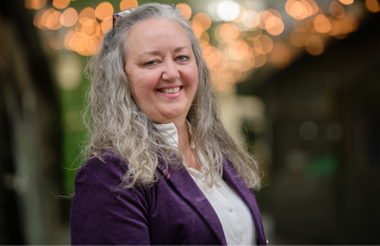In 2016, Borough Market joined the living wage movement and became the 2,500th accredited employer certified by the Living Wage Foundation.
For eight years, the charitable trust that runs London’s iconic market has been committed to paying every staff member the real living wage, a voluntary rate based on the cost of living.
But paying a fair hourly rate was no longer enough for Borough Market, which became an accredited living hours employer earlier this year.
Frontline workers
Borough Market is an unincorporated trust whose charitable objects are to provide “a market as a public amenity for the benefit of the public and the relief of the rates for the benefit of the inhabitants of the Parish of St Saviours, Southwark”.
The charity does not receive public funding and gets its core income from its estate via pitch fees and rents levied on its market stands and investment properties.
Chief executive Jane Swift describes her organisation as “a big landlord” that offers “affordable” rent and service charges for its traders.
She says: “It’s about small artisan producers. We’ve published our strategy which is holistically looking at food and the broken food system and the place as a community.
“As a charity, we’re unusual because it’s acts of parliament governing us and we’re here to preserve the land as a market for the benefit of the public.
“When we did our strategic work a year or so ago, we looked at a purpose statement that was more meaningful which is ‘for community, the love of food and a better tomorrow’.”
Borough Market “is quite a monster of an operation”, Swift says, with 28 properties, around 120 traders split between semi-permanent stands and umbrella traders and 41 employees.
A “good chunk” of the charity’s staff are frontline operational workers, Swift adds, who range from cleaners to security guards and supervisors to market managers.
“We’ve got a development team that works with the traders, taking them on the journey with us, our strategy and food policy. We’re looking at them as small businesses and what we can do to develop them,” says Swift.
“We’ve got a finance and property department and a bit of IT, HR, governance and admin. We’re operating 24/7 even though we’re open six days a week from Tuesday to Sunday – on Monday, there’s a massive deep clean.”
‘It’s the right thing to do’
Swift says that many people are unaware that Borough Market is run by a charitable trust whose obligation is to serve the community.
A fundamental part of that community is the staff who run the market and the people who keep it clean, safe and welcoming for the millions of visitors it gets each year.
That is why, she says, becoming an accredited living wage employer was an easy decision to make.
“In the end, it’s not just the right thing to do but it has benefits for everyone involved,” she says.
“The Borough Market trust wins, the staff win and the public who depend so much on their hard work and diligence wins too.
“Running a site like this, whether you’re security, a cleaner or one of the directors, everybody works hard, so it’s making sure that people are rewarded for all of that.”
Swift argues that being a living wage employer is also a way for her organisation to show employees that it cares about them and wants to give them a chance to thrive.
“When people aren’t paid enough, they tend to have more than one job. That affects their home life: they’re exhausted and don’t get any quality of life. So, that whole piece around making this a thriving place to work, rather than people just being able to survive, is important.
“We’ve got our accreditation because we want to say to the outside world that we care about our teams. It’s a badge of honour.”
Plus, as someone from a working-class background, Swift has experienced first-hand what it means to feel financially insecure.
“My parents were working-class people. My dad worked two jobs night and day and my mum did something similar in college. I’ve been that kid whose parents were struggling to make ends meet. Then, when my husband and I were trying to buy our place, we had five jobs going between us to make ends meet.
“This isn’t about ticking the box and just being the right thing to do. This is personal for me. I’ve experienced that both as a child and a parent. It’s important that we do what we can.”
Enticing traders
Borough Market is also supporting and encouraging its traders to gain living wage and living hours accreditations.
Ultimately, the charity hopes that everyone working in the market, not just its own staff, will be able to enjoy the same sense of security these provide.
Swift says: “We’ve started to work with our traders as part of our food policy. New traders are committed to paying the London living wage and do that as part of the application to get a place here.
“We’ve taken that next step further to say: ‘It's something we're looking for from everyone who trades here.’ We started doing this in the early part of the year and there are now 33 traders that have their living wage accreditation. Some of them are starting to look at their living hours.”
Swift concedes that it is not always easy to convince traders to become accredited, and some face unexpected challenges during the process.
“Because it’s still fairly early days, we’re working hand in hand with the traders to get them to understand that it’s not an onerous process. We’ve created detailed, frequently asked questions to bust any myths,” she says.
“We’ve got a buddy system where some of our accredited traders are working with those that aren’t yet accredited to help them through the process and answer questions.
“We’ve got a couple of complex businesses we’re working with to work out how we can overcome those things so that we’re hopefully beating the path for other traders that might have similar things and use those as a case study. We’ve got a way to go.”
Ensuring secure working hours
Swift says that being a living wage employer is only one part of the equation, with staff also entitled to know how many hours and when they will work so they can feel secure in their jobs, organise their lives and plan for the future.
In May, the Living Wage Foundation announced that Borough Market had become an accredited living hours employer, “ensuring secure working hours and shift patterns”.
Living hours is an initiative that builds upon the living wage accreditation and requires employers to provide workers with at least four weeks’ notice of shifts, with guaranteed payment if they are cancelled within this period.
It also requires accredited employers to offer a minimum of 16 working hours every week to each employee; and a contract that accurately reflects the number of hours worked.
Swift says: “You’ve got to pay the right amount and then you’ve got to make the right number of hours available. We wanted to make sure that people had the hours they needed and some way of planning their lives.
“Living hours is four weeks but we tend to do six weeks and try and extend that out to 12 weeks if we can so that people can plan in advance.
“That security of agreed hours gives people certainty: they haven’t got that anxiousness of financial instability and all that goes with that, the mental health issues and impact that that has on people’s families. It’s the right thing to do.”
She adds that Borough Market has started to put its toe in the water about the living pension accreditation and what that might mean, “trying to do all that we possibly can for the people working hard for us”.
“Everything about us is about our values and we feel that that’s a fundamental basic that we have to be living and breathing, supporting and caring for our teams in what we do.”
Other charities can ‘take the leap’
Swift acknowledges that the charity sector is in a “tough” place at the moment, financially, but she would encourage any charity to “take the leap” and become living wage employers.
“Look at it and even if you can’t do it right this minute, just lay yourself out a journey to get to that gradually or have that conversation with the Living Wage Foundation because there are so many different types of businesses that have the accreditation.
“They’ve probably seen everything and worked out a way that things are achievable.
“Encourage that dialogue and bust those myths. Don’t think this is something that you can’t do because we hear ‘this is too expensive’. Just understand the consequences of that.
“Often, charity jobs are much lower paid than commercial roles but as a charity, I think there are principles and values that start with the people in our teams.”
Related articles












